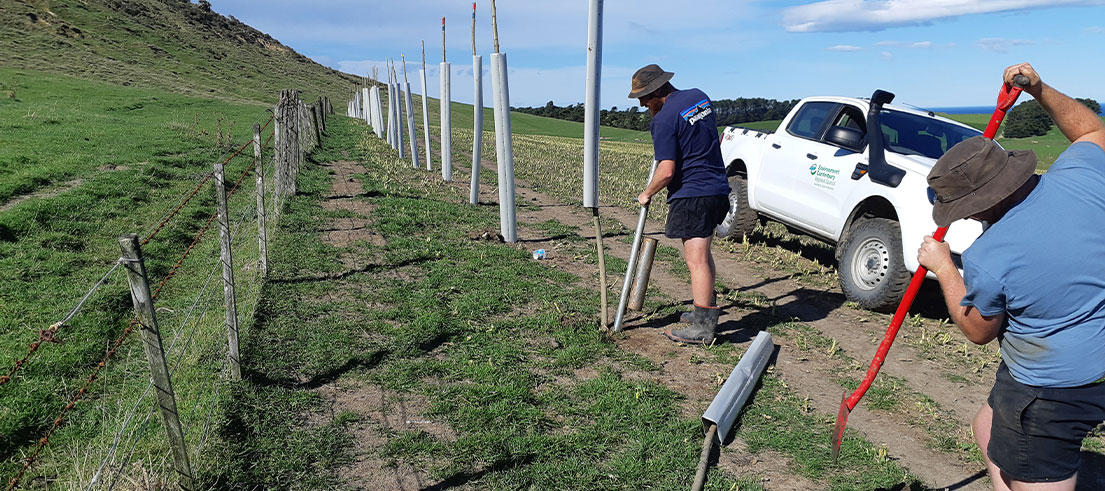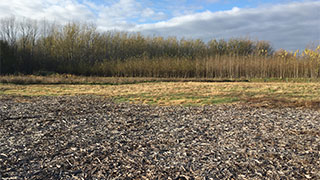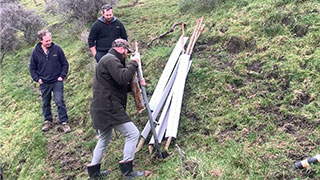
Soil Conservation and Revegetation Programme marks another successful year
Our Soil Conservation and Revegetation Programme (SCAR) has marked another successful year with significant fencing and planting projects being undertaken.
The four-year programme, which has funding support from the Ministry for Primary Industries (MPI), aims to reduce erosion and sediment loss, and stabilise damaged land in North Canterbury’s hill-country.
Farmers taking part in the programme are helping decrease the amount of sediment washed into waterways, which will deliver long-term environmental benefits such as better water quality. They are achieving this by:
- planting poplar and willow poles on sloping land, stablising soils
- retiring erosion prone land, allowing these areas to revegetate
- identifying erosion-prone land with Land Use Capability maps and adjusting farm management methods to better manage erosion
- and increasing awareness of the different tools to manage erosion prone hill country.
How it works
The programme offers discounted poplar and willow poles from our Baynons nursery; funding towards fencing to keep stock out of eroding areas and natives plants to assist regeneration of those areas; and Land Use Capability maps, which assess the risks to land and help identify erosion prone areas.
It helps staff and landowners collate knowledge to have wider discussions on farm management and how improvements might be made.
Programme progress protects soils
Over the last year the programme has:

Baynons nursery
- mapped 20 farms with Land Use Capability
- fenced off 140-hectares of eroding land with existing native bush from stock
- attended six workshops with the community
- planted just over 300-hectares of eroding pastural land with poplar poles to reduce erosion in hill country
- involved about 200 landowners in the programme
- sought feedback from funding recipients to improve the programme's processes and identify other ways we can support landowners in the hill country.
This winter, 100 landowners will be receiving 8,000 willow/poplar poles (tree cuttings) to plant on their erosion-prone land. This year has seen an increase of 40 landowners from the year prior.
Former SCAR programme coordinator Meredith Macdonald said it’s great to see a continued growth in interest for the programme.
"It’s been running for three years now and over the last year, staff have been inundated with enquiries for advice and/or funding," she said.
"It’s a really positive sign that the programme’s benefits are being shared throughout our hill-country farming community and we are building strong connections with these farmers — which is exciting."
Meredith said this last year has been significant for both retiring eroding prone land and protecting pastural areas.
"The programme has provided funding to eight projects covering over 225-hecatres to retire erodible land with native vegetation in the Hurunui and Kaikoura districts," she said.
"This portion of the programme is to protect the existing native flora and prevent further erosion and this can be achieved through putting in appropriate fencing and allowing natural flora to regenerate. Additionally, this takes out these marginal eroding areas from farm systems," she added.
Evaluating a fifth of the 4950 poles planted in 2021, it was assessed that the survival rate was 91 percent.

Team members installing the poles
Meredith said she is pleased to see the survival rate increase as the programme continues.
"We’ve seen it jump up each year, which is awesome," she said.
"We know the main reasons for failures this past year has been due to poor cultivation, so to improve this we continue to provide on-farm workshops on how to best plant these 3- metre poles.
"This year, demand has been enormous and we see this continue to increase, so our focus in the future will be making sure we improve the quality of the poles we are delivering," she added.
Survey results
A survey of funding recipients from the SCAR programme has also confirmed just how successful it’s been.
Close to 80 percent of respondents said they are doing more to reduce hill country erosion as a result of the programme.
"This indicates the programme is influencing a change in behaviour in North Canterbury. The next challenge will be to keep delivering to a high standard and focusing on those catchments where high hill-country erosion is occurring," Meredith said.
What’s next for SCAR
Environment Canterbury has applied to the Ministry of Primary Industries to extend the programme for another four years, after it finishes mid-2023.
"Another change for SCAR is that I am taking on a new role within Environment Canterbury," Meredith said.
"So that leaves the programme in the very capable hands of Iana Stoliarova, as the new coordinator. I’ll still be out there helping to build those rural connections though, so this won’t be the last you see of me," she added.
For more information
To find out about funding for erosion control, email soilcon@ecan.govt.nz, or go to the SCAR webpage.
- Check out the products and prices at Baynons nursery
- Download the Land Use and Capability Information factsheet (PDF File, 2.0MB)
- Download the willows on farms brochure (PDF File, 1.0MB) and the poplars on farms brochure (PDF File, 771KB)
- Visit Farm Forestry New Zealand's website for general information on poplar poles and guidance on how to plant poles successfully
